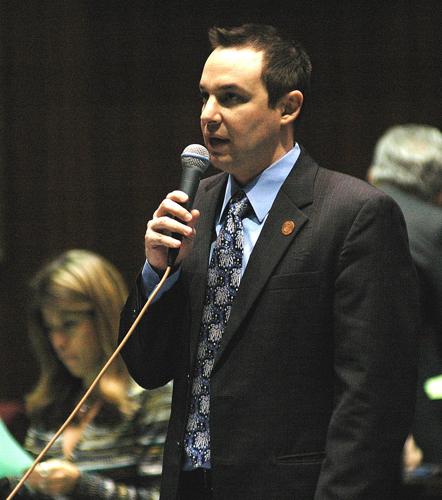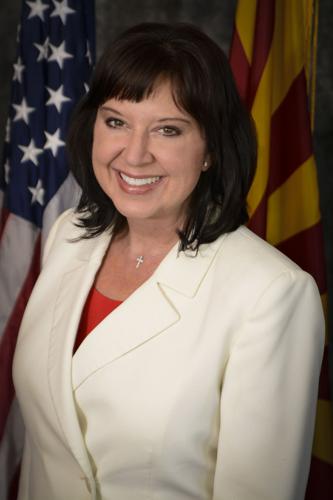PHOENIX — A House panel approved massive changes in campaign finance laws Tuesday despite a Democrat lawmaker pointing up what he said is a laundry list of flaws and loopholes that will open the door to more “dark money.”
The 5-2 party line vote of the Republican-controlled Elections Committee came after business interests who have been historically involved in trying to influence elections told legislators they like the new version.
“Our speech and our voices should be valued,” said Glenn Hamer, president of the Arizona Chamber of Commerce and Industry. He said the changes, crafted by the Secretary of State’s Office under control of Republican Michele Reagan, strike the proper balance between going after the “bad actors” while leaving what he said are legitimate organizations like his alone.
The vote paves the way for SB 1516, which already has been approved by the Senate, to go to the full House and, assuming it passes there, to Gov. Doug Ducey.
But even if it overcomes all those hurdles, it may not be the last word:
Attorney Tom Ryan, a foe of the changes, told legislators he will lead a petition drive to put the issue on the ballot. And if Ryan can gather 75,321 valid signatures by later this summer the measure gets placed on “hold” until after the measure gets approved or rejected by voters in November.
“Nobody, but nobody woke up this morning in the state of Arizona and said the problem with Arizona politics is there’s not enough money and there’s too much requirement for disclosure,” said Ryan, who has been instrumental in political affairs from the recall of former state Sen. Russell Pearce to complaints that led to Susan Bitter Smith quitting the Arizona Corporation Commission.
State Rep. Ken Clark, D-Phoenix, said the changes in SB 1516 amount to giving a shield of anonymity to those who work to influence elections.
For example, Clark said the legislation surrenders the right of election officials to demand records from a group to determine whether it is organized for the primary purpose of affecting the outcome of an election. That designation is significant because it requires such groups to disclose not only how they are spending their money but also the true source of the dollars behind the group.
Under SB 1516, the secretary of state would instead rely on how a group is classified under the Internal Revenue Code. And Clark said an IRS audit on a group’s spending to see if it is exempt from reporting donors might not come for more than a year after an election.
On top of that, Clark said the measure would eliminate requirements for groups to register before they make independent expenditures on behalf of candidates. He said that will allow groups to come into the state, spend a bunch of money on a race right before the election, and be gone before anyone knows who is funding it.
Eric Spencer, Reagan’s elections director who crafted much of the legislation, said any last-minute blitz of TV commercials still would have to contain the name of the group. But Clark said that provides little comfort if an ad-hoc committee is created.
“So somebody creates Arizonans for Ice Cream, Pie and Puppies ... and hits everybody with clearly untrue accusations,” he said. “Nobody’s going to really know what that’s all about until the next time they file their IRS filings.”
Spencer did not dispute the legislation could leave voters in the dark about who is behind that nice-sounding group. But he told lawmakers that doesn’t mean it’s the role of government to help them find out.
“I also think voters are smart enough to understand that when they are peppered with a political message with an anodyne (nice sounding) title that they should discount the validity of that message,” Spencer said.
Those limits on what voters can learn in SB 1516 did not bother state Rep. J.D. Mesnard, R-Chandler, who said sometimes too much disclosure is actually a bad thing.
“I do err on the side of folks have the right to influence their elected officials because their elected officials are going to influence them and their way of life,” he said. The alternative, said Mesnard, is too much information.
“The end result is a registry of every person and who they donated to,” he said. “I think that is entirely dangerous.”
Clark also noted that the change eliminates the $100 cap on what people can spend on food and entertainment for fundraising parties. He said that creates a “huge loophole” for big donors to help out candidates in a very public way.
Then there’s a provision that allows political parties to provide unlimited support to candidates in the form of things like bumper stickers and yard signs, all money from other sources that would no longer come from donations reported by the candidate.
Then there’s the question of punishment for those who violate the regulations that would be left.
Current law provides an automatic penalty equal to three times the amount spent illegally. Spencer’s measure reduces that to the amount of overspending, though he said it could be higher if those bringing the complaint convince the secretary of state the violation merits a higher fine.









